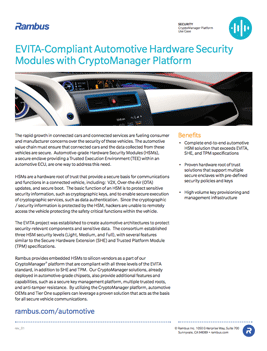Download “Download “EVITA-Compliant Automotive Hardware Security Modules with CryptoManager Platform Use Case” ”
The rapid growth in connected cars and connected services are fueling consumer and manufacturer concerns over the security of these vehicles. The automotive value chain must ensure that connected cars and the data collected from these vehicles are secure. Automotive-grade Hardware Security Modules (HSMs), a secure enclave providing a Trusted Execution Environment (TEE) within an automotive ECU, are one way to address this need. Download the use case to learn how Rambus provides HSMs to silicon vendors as a part of our CryptoManager solution that are compliant with all three levels of the EVITA standard.

